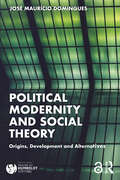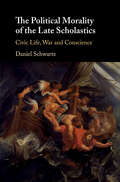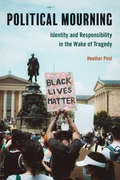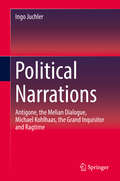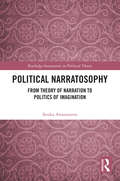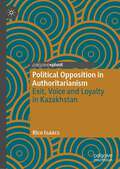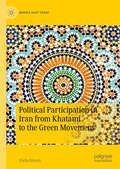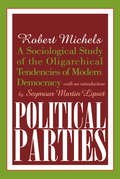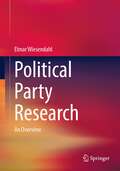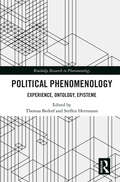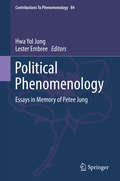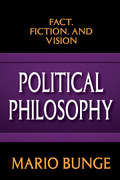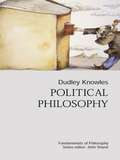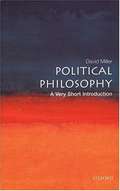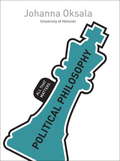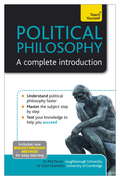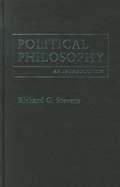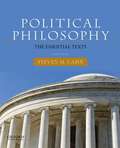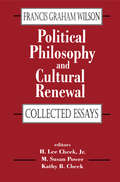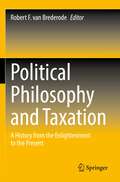- Table View
- List View
Political Modernity and Social Theory: Origins, Development and Alternatives
by Jose Maur¡cio DominguesModern liberal democracy and authoritarian collectivism have known diverse political regimes; autocratic, oligarchic or democratic, they each consist of a mixed, partly oligarchic regime in which plebeian politics are subordinated. With authoritarian collectivism’s defeat, a return to modernity has produced one more hybrid configuration.An in-depth investigation of political modernity and how it is differentiated from other forms of society, this book researches its origins and trajectory as a specific dimension of modern civilisation – articulating a renewed critical theory through an analysis of rights and law, politics, state and autonomy, social reproduction, crisis and political change.Examining these diverse aspects, Political Modernity and Social Theory proposes an encompassing and far-reaching approach spanning past and present – stressing radical plebeian democracy and maintaining a strong opening to the future and to possible alternatives to modernity.The Open Access version of this book, available at www.taylorfrancis.com, has been made available under a Creative Commons Attribution (CC-BY) 4.0 license.
The Political Morality of the Late Scholastics: Civic Life, War and Conscience
by Daniel SchwartzThe late scholastics, writing in the Baroque and Early Modern periods, discussed a wide variety of moral questions relating to political life in times of both peace and war. Is it ever permissible to bribe voters? Can tax evasion be morally justified? What are the moral duties of artists? Is it acceptable to fight in a war one believes to be unjust? May we surrender innocents to the enemy if it is necessary to save the state? These questions are no less relevant for philosophers and politicians today than they were for late scholastic thinkers. By bringing into play the opinions and arguments of numerous authors, many of them little known or entirely forgotten, this book is the first to provide an in-depth treatment of the dynamic and controversial nature of late scholastic applied moral thinking which demonstrates its richness and diversity.
Political Mourning: Identity and Responsibility in the Wake of Tragedy
by Heather PoolWhat leads us to respond politically to the deaths of some citizens and not others? This is one of the critical questions Heather Pool asks in Political Mourning. Born out of her personal experiences with the trauma of 9/11, Pool’s astute book looks at how death becomes political, and how it can mobilize everyday citizens to argue for political change. Pool examines four tragedies in American history—the Triangle Shirtwaist Factory Fire, the lynching of Emmett Till, the September 11 attacks, and the Black Lives Matter movement—that offered opportunities to tilt toward justice and democratic inclusion. Some of these opportunities were taken, some were not. However, these watershed moments show, historically, how political identity and political responsibility intersect and how racial identity shapes who is mourned. Political Mourning helps explain why Americans recognize the names of Trayvon Martin and Sandra Bland; activists took those cases public while many similar victims have been ignored by the news media. Concluding with an afterword on the coronavirus, Pool emphasizes the importance of collective responsibility for justice and why we ought to respond to tragedy in ways that are more politically inclusive.
Political Narrations: Antigone, The Melian Dialogue, Michael Kohlhaas, The Grand Inquisitor And Ragtime
by Ingo JuchlerThis book analyzes narrations embedded in political disputes, allowing readers to gain a deeper understanding of modern political reality. The author explores this theme in readings of the Sophocles tragedy Antigone, the Melian Dialogue of Thucydides, Heinrich von Kleist’s novella Michael Kohlhaas, Fyodor Dostoevsky's The Grand Inquisitor and E.L. Doctorow’s Ragtime novel, taking into account the relevant interdisciplinary aspects of the narratives. His study of these four narrations focuses on key political concepts, such as might and right, self-interest, legality and justice, the nation-state and democracy, and relates them compellingly to current actuality. Since narrations can exert comprehensive and lasting influence on individuals’ political discernment, this systematic analysis allows for a better comprehension of politics in education and civics.
Political Narratosophy: From Theory of Narration to Politics of Imagination (Routledge Innovations in Political Theory)
by Senka AnastasovaPolitical Narratosophy offers a critically subversive rethinking of the political and philosophical significance of narrative, and why feminist epistemology and feminist social theory matters for the meaning of the ‘self’ and narrativity. Through a re-examination of the notions of democracy and emancipation, Senka Anastasova coins the term ‘political narratosophy’, a unique interpretation of the philosophy of narrative, identification, and disidentification, developed in conversation with philosophers Jacques Rancière, Nancy Fraser, and Paul Ricoeur. Utilizing the author’s own identity as a feminist philosopher has lived in socialist Yugoslavia, post-Yugoslavia, and Macedonia (now North Macedonia), Anastasova explores the fluctuating and disappearing borders around which identity is situated in a country that no longer exists. She expertly reveals how the subject finds, makes and unmakes itself through narrativity, politics, and imagination. Political Narratosophy is an important intervention in political philosophy and a welcome contribution to the historiography on female authors who lived through twentieth century communism and its aftermath. It will be of great interest to scholars and researchers in the fields of political theory, philosophy, women’s studies, international relations, identity studies, (comparative) literary studies, and aesthetics studies.
Political Obligation: A Critical Introduction (Routledge Contemporary Political Philosophy)
by Dudley KnowlesPolitical obligation is concerned with the clash between the individual’s claim to self-governance and the right of the state to claim obedience. It is a central and ancient problem in political philosophy. In this authoritative introduction, Dudley Knowles frames the problem of obligation in terms of the duties citizens have to the state and each other. Drawing on a wide range of key works in political philosophy, from Thomas Hobbes, John Locke, David Hume and G. W. F. Hegel to John Rawls, A. John Simmons, Joseph Raz and Ronald Dworkin, Political Obligation: A Critical Introduction is an ideal starting point for those coming to the topic for the first time, as well as being an original and distinctive contribution to the literature. Knowles distinguishes the philosophical problem of obligation - which types of argument may successfully ground the legitimacy of the state and the duties of citizens - from the political problem of obligation - whether successful arguments apply to the actual citizens of particular states. Against the anarchist and modern skeptics, Knowles claims that a plurality of arguments promise success when carefully formulated and defended, and discusses in turn ancient and modern theories of social contract and consent, fairness and gratitude, utilitarianism, justice and a Samaritan duty of care for others. Against modern communitarians, he defends a distinctive liberalism: ‘the state proposes, the citizen disposes’.
Political Opposition in Authoritarianism: Exit, Voice and Loyalty in Kazakhstan (The Theories, Concepts and Practices of Democracy)
by Rico IsaacsHow might political opposition shape regime outcomes over time in an authoritarian system? Most studies on political opposition in authoritarian contexts tend to focus on the agency of the regime over and above that of the political opposition. Using Albert Hirschman’s framework of exit, voice and loyalty, this book examines the case of Kazakhstani opposition agency over 30 years to explore the extent to which political opposition in Kazakhstan has shaped the dynamics of authoritarian regime development in the country. What the analysis reveals is that in Kazakhstan the regime has tended to treat formal institutional political opposition as neither a credible nor non-credible threat. Consequently, the Kazakhstani regime has always responded to opposition exit and voice with sanctions and institutional adaption which strengthened the regime in the short to medium term, but left them exposed to spontaneous, grassroots non-institutional opposition in the longer term. This spontaneous grassroots opposition emerged in Kazakhstan as a series of ‘shocks’ crystalised in the 2011 events in Zhanaozen, the 2016 land protests, the 2019 election protests and the events of ‘qandy qantar’ (bloody January) in 2022. What this book illustrates is how authoritarian regimes which treat opposition threats ambiguously are likely to end up in a continuous state of instability because the feedback provided by opposition agency disappears leaving the regime susceptible to spontaneous opposition.
Political Order and Inequality
by Carles BoixThe fundamental question of political theory, one that precedes all other questions about the nature of political life, is why there is a state at all. Is human cooperation feasible without a political authority enforcing it? Or do we need a state to live together? This problem then opens up two further questions. If a state is necessary to establish order, how does it come into place? And, when it does, what are the consequences for the political status and economic welfare of its citizens? Combining ethnographical material, historical cases, and statistical analysis, this book describes the foundations of stateless societies, why and how states emerge, and the basis of political obligation. As a result of this inquiry, it explains the economic and political roots of inequality, describes the causes of the stagnation of the preindustrial world, and explores what led to the West's prosperity of the past two centuries.
Political Participation in Iran from Khatami to the Green Movement (Middle East Today)
by Paola RivettiThis book examines the unintended consequences of top-down reforms in Iran, analysing how the Iranian reformist governments (1997–2005) sought to utilise gradual reforms to control independent activism, and how citizens responded to such a disciplinary action. While the governments successfully ‘set the field’ of permitted political participation, part of the civil society that took shape was unexpectedly independent. Despite being a minority, independent activists were not marginal: without them, in fact, the Green Movement of 2009 would not have taken shape. Building on in-depth empirical analysis, the author explains how autonomous activism forms and survives in a semi-authoritarian country. The book contributes to the debate about the implications of elite-led reforms for social reproduction, offering an innovative interpretation and an original analysis of social movements from a political science perspective.
Political Parties: A Sociological Study of the Oligarchical Tendencies of Modern Democracy
by Robert MichelsThe principle of self-government through political parties, the cornerstone of democracy, has come to be regarded as a solution to the problem of nationality. This is because the principle of nationality entails the acceptance of the idea of popular government. The importance of the principle of nationality is undeniable, and most of the national questions of Western Europe might be solved in accordance with this principle. Matters are complicated by geographical and strategical considerations, such as the difficulty of determining natural frontiers and the frequent need to establish strategic frontiers. Moreover, the principle of nationality cannot help us where nationalities barely exist or where they are entangled in inextricable confusion.The present work is a critical discussion of the problem of democracy. Michels believes that democracy, as an intellectual theory and as a practical movement, has entered upon a critical phase from which exit will be extremely difficult. In this book he analyzes the tendencies that oppose the realization of democracy, and claims that these tendencies can be classified in three ways: dependence upon the nature of the individual; dependence upon the nature of the political structure; and dependence upon the nature of organization.This edition, described by Morris Janowitz as a "classic of modern social science" and by Melvin Tumin as "the beginning of a tradition," offers a landmark study in political science. Following its original publication in 1910, the study and analysis of political parties was established as a new branch of science. Political Parties continues to be a foundation work in the literature and is a necessary addition to the libraries of contemporary political scientists, sociologists, and historians.
Political Party Research: An Overview
by Elmar WiesendahlThe book by the well-known German party researcher Elmar Wiesendahl presents the development, theoretical perspectives, research approaches, and fields of investigation in party research in light of the state of the art.
Political Phenomenology: Experience, Ontology, Episteme (Routledge Research in Phenomenology)
by Thomas Bedorf Steffen HerrmannIn recent years phenomenology has become a resource for reflecting on political questions. While much of this discussion has primarily focused on the ways in which phenomenology can help reformulate central concepts in political theory, the chapters in this volume ask in a methodological and systematic way how phenomenology can connect first-person experience with normative principles in political philosophy. The chapters are divided into three thematic sections. Part I covers the phenomenology of political experience. The chapters in this section focus on a variety of experiences that we come across in political practice. The chapters in Part II address the phenomenology of political ontology by examining the constitution of the realm of the political. Finally, Part III analyzes the phenomenology of political episteme in which our political world is grounded. Political Phenomenology will be of interest to researchers working on phenomenology, Continental philosophy, and political theory.
Political Phenomenology
by Hwa Yol Jung Lester EmbreeThis volume presents political phenomenology as a new specialty in western philosophical and political thought that is post-classical, post-Machiavellian, and post-behavioral. It draws on history and sets the agenda for future explorations of political issues. It discloses crossroads between ethics and politics and explores border-crossing issues. All the essays in this volume challenge existing ideas of politics significantly. As such they open new ways for further explorations BY future generations of phenomenologists and non-phenomenologists alike. Moreover, the comprehensive chronological bibliography is unprecedented and provides not only an excellent picture of what phenomenologists have already done but also a guide for the future.
Political Philosophy
by Ronald BeinerHannah Arendt's last philosophical work was an intended three-part project entitled The Life of the Mind. Unfortunately, Arendt lived to complete only the first two parts, Thinking and Willing. Of the third, Judging, only the title page, with epigraphs from Cato and Goethe, was found after her death. As the titles suggest, Arendt conceived of her work as roughly parallel to the three Critiques of Immanuel Kant. In fact, while she began work on The Life of the Mind, Arendt lectured on "Kant's Political Philosophy," using the Critique of Judgment as her main text. The present volume brings Arendt's notes for these lectures together with other of her texts on the topic of judging and provides important clues to the likely direction of Arendt's thinking in this area.
Political Philosophy: Fact, Fiction, and Vision
by Mario BungePolitical philosophy is not a well-defined field. It hovers between political theory and classical philosophy. Few early political thinkers could have anticipated the most pressing political issues of our time: the need to stop global warming; the reduction of nuclear armaments; the rise of inequality between individuals and nations; and the struggle against authoritarianism, particularly when it comes disguised as democracy or as socialism. Here, celebrated philosopher Mario Bunge masterfully integrates socio-political theory into a philosophical exploration of power and resource distribution in the world today.Bunge contends that even recent political thinkers have generally failed to address the political underpinnings of topical issues. Environmental degradation, gender and race discriminations, participative democracy, nationalism, imperialism, the North-South divide, resource wars, and the industrial-military complex have all largely been bypassed in political thinking. Even connections between poverty and environmental degradation, and between inequality and bad health, have escaped the attention of those who would call themselves political thinkers.Bunge believes that political philosophers should pay more attention to social indicators, such as the standard index of income inequality and the United Nations human development index. It is pointless to write about redistributive policies unless we have a shared understanding of current wealth distribution. This is, in short, a modern treatise on sociopolitical concerns.
Political Philosophy
by Dudley KnowlesThis comprehensive introduction to the major thinkers and topics in political philosophy explores the philosophical traditions which continue to inform our political judgements.Dudley Knowles introduces the ideas of key political thinkers including Hobbes, Locke, Marx and Mill and influential contemporary thinkers such as Berlin, Rawls and Nozick. He outlines central problems in political philosophy and encourages the reader to critically engage with all the issues discussed.The individual chapters discuss and analyse:* utilitarianism* liberty* rights* justice* obligation* democracyPolitical Philosophy is ideally suited to students taking introductory courses in political theory and philosophy.
Political Philosophy: A Very Short Introduction
by David MillerThis book introduces readers to the key concepts of political philosophy: authority, democracy, freedom and its limits, justice, feminism, multiculturalism, and nationality. Accessibly written and assuming no previous knowledge of the subject, it encourages the reader to think clearly and critically about the leading political questions of our time. Miller first investigates how political philosophy tackles basic ethical questions such as 'how should we live together in society?' He furthermore looks at political authority, discusses the reasons society needs politics in the first place, explores the limitations of politics, and asks if there are areas of life that shouldn't be governed by politics. Moreover, he explores the connections between political authority and justice, a constant theme in political philosophy, and the ways in which social justice can be used to regulate rather than destroy a market economy. In his travels through this realm, Miller covers why nations are the natural units of government and wonders if the rise of multiculturalism and transnational co-operation will change all this, and asks in the end if we will ever see the formation of a world government.
Political Philosophy: All That Matters
by Johanna OksalaWhat is political philosophy? A philosophical study of political ideas such as authority, freedom, justice and democracy? An inquiry into the best form of government? An attempt to rationally justify forms of authority? Johanna Oksana asks exactly these questions as she opens this brilliant new guide to political philosophy. Rather than attempting to provide the reader with a definite answer, the book invites readers to recognize many of the issues encountered in everyday life as political, the outcome of human practices that incorporate power relations, social norms and obligations. It suggests that political philosophy should be understood as an open-ended, critical project that to some extent concerns everyone. The book employs an original structure which will be a huge help to both students and general readers seeking to understand the topic. Each chapter, which moves chronologically from antiquity to the twentieth century, focuses on selected classic texts in political philosophy, which are briefly introduced and analysed. The texts then function as a springboard for a discussion of central contemporary issues in political philosophy.
Political Philosophy: Teach Yourself
by Phil Parvin Clare ChambersWritten by Phil Parvin and Clare Chambers, who are current political philosophy lecturers and leading researchers, Political Philosophy - The Essentials is designed to give you everything you need to succeed, all in one place. It covers the key areas that students are expected to be confident in, outlining the basics in clear jargon-free English, and then providing added-value features like summaries of key thinkers, and even lists of questions you might be asked in your seminar or exam. The book's structure follows that of most university courses on political philosophy, by looking at the essential concepts within political philosophy (freedom, equality, power, democracy, rights, the state, political obligation), and then looking at the ways in which piolitical philosophers have used these fundamental concepts in order to tackle a range of normative political questions such as whether the state has a responsibility to alleviate inequalities, and what interest liberal and demovratic states should take in the cultural or religious beliefs of citizens. Teach Yourself titles employ the 'Breakthrough method', which is designed specifically to overcome problems that students face. - Problem: 'I find it difficult to remember what I've read.'; Solution: this book includes end-of-chapter questions and summaries, - Problem: 'Most books mention important other sources, but I can never find them in time.'; Solution: this book includes key texts and case studies are summarised, complete with fully referenced quotes ready to use in your essay or exam. - Problem: 'Lots of introductory books turn out to cover totally different topics than my course.'; Solution: this book is written by a current university lecturer who understands what students are expected to know.
Political Philosophy
by Richard G. StevensThis book by Richard G. Stevens is a comprehensive introduction to the nature of political philosophy. It offers definitions of philosophy and politics, showing the tension between the two and the origin of political philosophy as a means of resolution of that tension. Plato and Aristotle are examined in order to see the search for the best political order. Inquiry is then made into political philosophy's new tension brought about by the growth of revealed religion in the Middle Ages. It then examines the changes introduced by modernity and gives an overview of postmodern political thought. The book covers the most influential philosophers and directs readers to the classics of political philosophy, guiding them in studying them. It is an approachable introduction to a complex subject, not just a history of it. It is a point of entry into the subject for students and for others as well.
Political Philosophy (3rd Edition): The Essential Texts
by Steven M. CahnPolitical Philosophy: The Essential Texts is ideal for survey courses in political philosophy. Offering wide coverage from antiquity to the present, this historically organized collection presents the most significant works from nearly 2,500 years of political philosophy.
Political Philosophy After 1945
by Alan HaworthBy the mid-twentieth century interest in political philosophy had dwindled, with one writer even pronouncing the subject ‘dead’. Things were to change in 1971, when the subject experienced a renaissance with the publication of John Rawls’s A Theory of Justice. The story didn’t end with Rawls however, as other avenues through which to approach the subject became available. In Political Philosophy After 1945 Alan Haworth tells the story of political philosophy from the mid-twentieth century to the early twenty-first. First, he considers why the subject should have become marginalised by mainstream philosophical movements such as logical positivism and the ‘ordinary language philosophy’ inspired by Wittgenstein. Subsequent chapters explain the fundamentals of Rawls’s theory, and then compare and contrast his contribution with that of other philosophers from across the political spectrum. These are followed by chapters in which alternative approaches are examined. There are in-depth accounts of works by Hannah Arendt and Alasdair MacIntyre, as well as an evaluation of the claim that political philosophy exemplifies the pursuit of a moribund ‘Enlightenment project’. Throughout the book, Haworth strikes a balance between historical perspective and close analysis of major texts, and he is careful to emphasise the relevance of theoretical issues to questions which arise beyond theory. As such, Political Philosophy After 1945 is essential reading for students and scholars of political philosophy, but also serves as an introduction for students from across the Humanities and Social Sciences approaching the topic for the first time.
Political Philosophy: All That Matters (All That Matters)
by Johanna OksalaWhat is political philosophy? A philosophical study of political ideas such as authority, freedom, justice and democracy? An inquiry into the best form of government? An attempt to rationally justify forms of authority? Johanna Oksana asks exactly these questions as she opens this brilliant new guide to political philosophy. Rather than attempting to provide the reader with a definite answer, the book invites readers to recognize many of the issues encountered in everyday life as political, the outcome of human practices that incorporate power relations, social norms and obligations. It suggests that political philosophy should be understood as an open-ended, critical project that to some extent concerns everyone. The book employs an original structure which will be a huge help to both students and general readers seeking to understand the topic. Each chapter, which moves chronologically from antiquity to the twentieth century, focuses on selected classic texts in political philosophy, which are briefly introduced and analysed. The texts then function as a springboard for a discussion of central contemporary issues in political philosophy.
Political Philosophy and Cultural Renewal: Collected Essays of Francis Graham Wilson (Library Of Conservative Thought Ser.)
by Francis WilsonFrancis Graham Wilson was a central figure in the revival of interest in political philosophy and American political thought in the mid-twentieth century. While he is best known as a Catholic writer and conservative theorist, his most significant contribution is his original interpretation of the development of American politics. Central to his thought was a process of self-interpretation by the citizenry, a quest for ultimate meaning turning to a divine, transcendent, basis of history and shared experience. Although Wilson's writings were extensive and influential, they have not been readily available for decades.
Political Philosophy and Taxation: A History from the Enlightenment to the Present
by Robert F. van BrederodeThis book explores how taxation is related to the role of the state and its relationship with its constituents, the concept of private property rights, the concepts of societal fairness and justice, and the battle between the individual and the collective. This book appeals to students and scholars who want to know how philosophers in the past and present think about taxation, and how their thinking has developed through cross-influencing. There exists no comprehensive study providing such an overview. This book is a foundational study on the philosophical justification of taxation (qualitative aspect) and the normative qualifications required of tax law to constitute tax that is just and fair (distributive or quantitative aspect). The latter includes evaluation of what type of tax is morally correct or acceptable to realize distributive justice. This book covers periods from the Enlightenment era until the present. The philosophers are grouped together in schools of thought and each chapter except for chapter 1 and chapter 13, are is dedicated to a specific philosophical school. Moreover, this book aims to provide an overview of each school of thinking and the individual philosophers, including placing them in the context of their times. The book has particular importance as the study of taxation is an underdeveloped area of political and legal philosophy.
